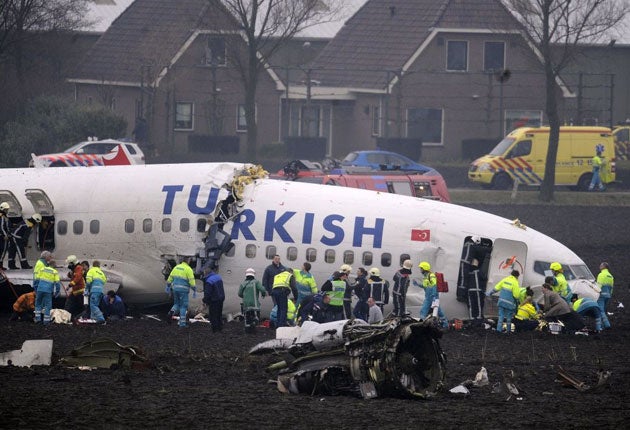Nine killed in jet crash at Amsterdam airport
Local reports suggest Turkish airliner ran out of fuel before landing tail-first in muddy field and breaking into three

Nine people died and scores were injured yesterday when a Turkish airliner crashed into a field near Schiphol airport in Amsterdam.
The Boeing 737-800 plunged to the ground seconds before it was due to land from Istanbul. It broke into three sections in the soft earth. There was no explosion or fire and dozens of passengers scrambled unhurt from the wreckage. Nine people were killed during the crash – mostly in the tail section and cockpit – and 49 were injured, 25 seriously.
Relatives waiting for the arriving passengers told how they had received mobile phone calls from loved ones trapped injured in the wreckage. One man said he had received a call from his anguished daughter screaming that both her legs were broken.
There were reports in the Dutch media that Turkish Airlines flight TK 1951, carrying 127 passengers and seven crew, had run out of fuel and lost power just before it reached the runway of Europe's fifth busiest airport. Investigators refused to comment last night.
Rather like the accident in the Hudson River in New York earlier this month, the pilots appear to have been attempting to make a controlled crash landing. Witness accounts, from passengers and motorists on a nearby motorway, suggested the plane had spun out of control at the last moment and hit the ground tail-first.
Dutch media said the Schiphol control heard the pilot say: "It's very serious but we will try to land now." One witness report said that the aircraft seemed to be struggling to avoid crashing on to the busy motorway.
A crash investigator said last night that three bodies were still in the plane's cockpit, believed to be those of the two pilots and an apprentice pilot. Investigators said the relatively low death toll may partly have been due to the pilots' efforts to make an emergency landing. They also pointed out that the six-year-old aircraft had both its engines torn off and had come to rest in damp, newly-ploughed earth two miles short of the runway. This, and improved safety standards for new aircraft may help to explain why it failed to explode or catch fire, they said.
The Turkish Transport Minister, Binali Yildirim, said it was "a miracle" so many people had survived. "The fact that the plane landed on a soft surface and there was no fire helped keep the number of fatalities low," he said.
Anguish and frustration was growing last night among relatives who had been waiting for the plane to arrive. They complained that they had originally been told that there was only one person killed. They protested that officials had been slow to give out the names of the dead and injured. "I just want to know if my nephew is still alive," said Yabhab Yabib, who had been taken with other friends and relatives to a nearby sports centre. The Anatolia agency said there were 72 Turks and 32 Dutch people on board but the nationality of other passengers was not immediately known.
The crash happened in light mist but good visibility, around 10.30am local time. The aircraft came to rest with its back broken and its tail section sliced away and turned towards the nose.
Margo de Witt, who was driving along the A6 motorway near the crash scene, told Dutch TV: "I glanced left to check for other cars and suddenly saw this plane going down with ... its tail sticking down. I saw one of the engines drop out and a huge amount of fumes but luckily no flames."
Mustapha Bahcecioglu, a passenger who emerged unscathed, said: "I was asleep in the plane and woke up because of the plane shaking so hard. We were out of balance and the pilot tried to straighten it up. But it didn't work and 10 seconds later we hit the ground."
"We came down with a big bang and screams broke out. We all got out through the exit doors and tried to help all the children out of the plane but there were people at the back we could not reach. The ambulances came very quickly. I saw several dead bodies and I saw very many people injured, very many."
Gideon Evers, spokesman for the International Federation of Airline Pilots Associations, rejected suggestions that the crash may have been caused by shortage of fuel. Regulations required all commercial flights to carry ample reserves, he said. "Certainly it appears to be an unusual circumstance but as always the sensible course of action is to wait for the results of the investigation," he said.
Turkish Airlines had a poor safety record in the 1970s, when 608 lives were lost in accidents involving its aircraft in the space of two years, but its performance has improved dramatically in recent times. Yesterday's crash was the airline's second fatal accident this decade.
Subscribe to Independent Premium to bookmark this article
Want to bookmark your favourite articles and stories to read or reference later? Start your Independent Premium subscription today.

Join our commenting forum
Join thought-provoking conversations, follow other Independent readers and see their replies